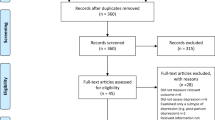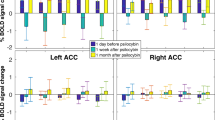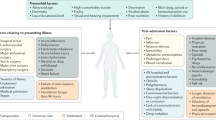Abstract
DOPAMINERGIC dysregulation remains an empirical cornerstone for theories concerning the causation of schizophrenia. Evidence for a dopamine system dysfunction in schizophrenia includes the psychosis-inducing effects of dopaminergic agonists1,2 and the antipsychotic potency of dopaminergic antagonists3,4. Here we use positron emission tomography (PET) to examine the regulatory role of dopamine on cortical function in normal subjects and unmedicated schizophrenic patients. Using a factorial experimental design, we compared the effect of dopaminergic manipulation with apomorphine on a neural response to a cognitive task. In the schizophrenic patients, relative to controls, an impaired cognitive activation of the anterior cingulate cortex was significantly modulated by a manipulation of dopaminergic neurotransmission. Thus, after apomorphine, the schizophrenic subjects displayed a significantly enhanced cognitive activation of the anterior cingulate cortex relative to the controls. These data provide in vivo evidence that an impaired cognitive-task-induced activation of the anterior cingulate cortex in schizophrenic patients can be significantly modulated by a dopaminergic manipulation.
This is a preview of subscription content, access via your institution
Access options
Subscribe to this journal
Receive 51 print issues and online access
$199.00 per year
only $3.90 per issue
Buy this article
- Purchase on Springer Link
- Instant access to full article PDF
Prices may be subject to local taxes which are calculated during checkout
Similar content being viewed by others
References
Davidson, M. et al. Am. J. Psychiat. 141, 934–938 (1987).
Lieberman, J. A. et al. Am. J. Psychiat. 141, 633–638 (1984).
Seeman, P., Lee, T., Chau-Wong, M. & Wong, K. Nature 261, 717–719 (1976).
Creese, I., Burt, D. R. & Snyder, S. H. Science 192, 481–483 (1976).
Frith, C. D., Friston, K. J., Liddle, P. F. & Frackowiak, R. S. J. Proc. R. Soc. Lond. B 244, 241–246 (1991).
Sawaguchi, T. & Goldman-Rakic, P. S. Science 251, 947–950 (1991).
Sawaguchi, T., Matsumura, M. & Kubota, K. J. Neurophysiol. 63, 1401–1411 (1990).
Weinberger, D. R. Trends Neurosci. 11, 367–370 (1988).
Retaux, S., Besson, M. J. & Penit-Soria, J. Neuroscience 42, 61–71 (1991).
Sawaguchi, T., Matsumura, M. & Kubota, K. J. Neurophysiol. 63, 1385–1399 (1990).
Cleghorn, J. M. et al. Psychiat. Res. Neuroimag. 40, 135–153 (1991).
Grace, A. A. Neuroscience 41, 1–24 (1991).
Andreasen, N. C. et al. Archs. gen. Psychiat. 49, 943–958 (1992).
Tamminga, C. A. et al. Archs. gen. Psychiat. 49, 522–530 (1992).
Liddle, P. et al. Br. J. Psychiat. 160, 179–186 (1992).
Benes, F. M., Davidson, J. & Bird, J. E. Archs. gen. Psychiat. 43, 31–35 (1986).
Benes, F. M., Vincent, S. I., Alsterberg, G., Bird, E. D. & SanGiovanni, J. P. J. Neurosci. 12, 924–929 (1992).
Bleuler, E. Dementia Praecox or the Group of Schizophrenias (International, New York, 1950).
McGhie, A. & Chapman, J. Br. J. med. Psychol. 34, 103–116 (1961).
Fallon, J. H. & Loughlin, S. E. in Cerebral Cortex; Further Aspects of Cortical Function, including Hippocampus Vol. 6 (eds Jones, E. G. & Peters, A.) 41–128 (Plenum. New York, 1987).
Friston, K. J. et al. in Biology of Schizophrenia and Affective Diseases (ed. Watson, S. J.) 449–481 (Raven, New York. 1995).
Frith, C. D. et al. Br. J. Psychiat. 167, 343–349 (1995).
Muller-Preuss, P. & Ploog, D. Brain Res. 215, 61–76 (1981).
Fletcher, P. C. et al. Brain 118, 401–416 (1995).
Grasby, P. M. et al. Psychol. Med. 23, 605–612 (1993).
Oldfield, R. C. Neuropsychologia 9, 97–113 (1971).
Friston, K. J. et al. Hum. Brain Mapp. 2, 198–210 (1995).
Friston, K. J. et al. Hum. Brain Mapp. (in the press).
Friston, K. J., Worsley, K. J., Frackowiak, R. S. J., Mazziotta, J. C. & Evans, A. C. Hum. Brain Mapp. 1, 214–220 (1994).
Friston, K. J., Frith, C. D., Liddle, P. F. & Frackowiak, R. S. J. J. cereb. Blood Flow Metab. 11, 690–699 (1991).
Author information
Authors and Affiliations
Rights and permissions
About this article
Cite this article
Dolan, R., Fletcher, P., Frith, C. et al. Dopaminergic modulation of impaired cognitive activation in the anterior cingulate cortex in schizophrenia. Nature 378, 180–182 (1995). https://doi.org/10.1038/378180a0
Received:
Accepted:
Issue Date:
DOI: https://doi.org/10.1038/378180a0
This article is cited by
-
Lifespan Gyrification Trajectories of Human Brain in Healthy Individuals and Patients with Major Psychiatric Disorders
Scientific Reports (2017)
-
Deficits in attentional processing of fearful facial expressions in schizophrenic patients
Scientific Reports (2016)
-
Neurobiological background of negative symptoms
European Archives of Psychiatry and Clinical Neuroscience (2015)
-
Differential regulation of observational fear and neural oscillations by serotonin and dopamine in the mouse anterior cingulate cortex
Psychopharmacology (2014)
-
The Utility of 11C-Arachidonate PET to Study in vivo Dopaminergic Neurotransmission in Humans
Journal of Cerebral Blood Flow & Metabolism (2012)
Comments
By submitting a comment you agree to abide by our Terms and Community Guidelines. If you find something abusive or that does not comply with our terms or guidelines please flag it as inappropriate.



